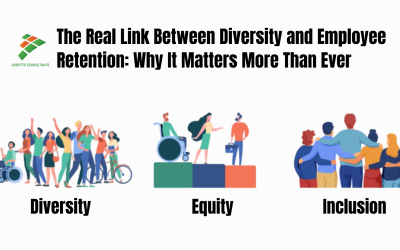In any time of change, from internal modifications within your company to worldwide global upheaval, people will look to leaders for guidance and support.
The one constant is change, but it can make your employees unsettled. Lack of understanding compounds issues, and low morale and a drop in productivity can quickly occur.
So, what can you do to ensure you lead with clarity and compassion during challenging times?
As an outstanding leader, you will be able to instil courage, positivity, and enthusiasm in your team and ensure that, whatever happens, you view change as a positive, looking to the future with confidence and resolution.
Whether you are new to leadership or would like to improve your leadership skills, this guide will help you build trust, develop your skillset and become an outstanding leader – capable of successfully leading a team through any challenging environment.
What Makes a Great Leader?
“A great leader possesses a clear vision, is courageous, has integrity, honesty, humility and clear focus. … Great leaders help people reach their goals, are not afraid to hire people that might be better than them and take pride in the accomplishments of those they help along the way.”
These are the qualities of an outstanding leader, according to Forbes. In turbulent times, everyone looks to great leaders for guidance. Leadership resonates throughout a business, and the quality of your leadership can be the difference between the ultimate success or failure of your organisation.
Good leaders exhibit specific traits which allow them to inspire, motivate and boost productivity to ensure the loyalty and productivity of their employees and companies success.
Before we look at how to become a great leader, if you are new to leadership, there are some initial steps you can take to engage your team from the start successfully.
New to Leadership?
If you are new to a leadership position, it’s crucial to engage your team right from the beginning, so you set the stage for your leadership and show yourself as approachable as well as a good strategist. So, here are some steps to implement.
Don’t Make Any Sweeping Changes
Often, individuals new to leadership sweep in with changes to assert the fact that they are now in control, or because they genuinely think they have a better solution to perceived problem areas. Unfortunately, this action can lead to disgruntled, resentful employees who believe that things were just fine as they were.
So, think before you implement sweeping changes. If you are planning modifications, spend some time first seeing how things operate as they are so that you can make informed, small changes that have everyone on board.
In the words of the late great Stephen Covey in his bestselling leadership book ”Seek first to understand.”
This is much more likely to be better received by your team, who will see you have taken time to understand and consider what is happening before decisions are made.
Have an Open-Door Policy
Operate an open-door policy so that your employees know they can come and talk to you if they have concerns or ideas; set aside a specific time each week when you are available for your team.
Being approachable in this way means you are far more likely to hear if there are any underlying problems within the team that you can then deal with before they become more impactful.
Talk to Your Team
Communication is the key to establishing a team that works. From transparent communications that cascade information to everyone, to actively listening to your team when they want to discuss ideas with you: communication is a two-way process.
Make the most of every interaction with your team and learn about their communication preferences too. For example, do they prefer you to email or walk across the room to communicate with them? Are you more likely to get an individual on board with an idea by having an informal or formal meeting?
Build a Positive Culture
A recent workplace study by Glassdoor, the well-known and respected recruitment review website found that 56% of employees valued an excellent company culture fit over salary.
Company culture is more critical now than it has ever been, with overwhelming research to suggest that organisations with poor company culture are far more likely to fail.
So, you must work towards building an environment where employees are respected and valued, where there are a shared vision and cohesive teamwork, and where communication and transparency are paramount.
Once you have your strategies for establishing your leadership style in place, what considerations should you have for daily team leadership that will help boost productivity and keep morale high?
Here are some suggestions based on what successful leaders we work with, in the space, are using now.

Daily Leadership Skills
Establish Equality
Treating your employees equally is paramount to building equality and diversity in your team. A good leader will aim to create a psychologically safe environment as discussed in full in this recent Hbr article – where employees can express their thoughts, concerns or plans.
Listen to Your Team
There is a difference between hearing someone and actively listening to them. In a busy workplace, it can be easy to hear someone speak and start forming an automatic response in your mind. But beware, as soon as you start thinking about your answer, you have already stopped listening to that person.
Learn to engage in listening and understanding actively to ensure you and your team have meaningful conversations.
Provide Motivational and Developmental Feedback
Providing timely feedback is critical for your employees’ development and of course, so that they can improve and are aware of the impact of their actions.
Unfortunately, leaders can fall into feedback traps. As a general rule, many avoid giving feedback promptly, so behaviours continue unchecked. Or they deliver too much developmental feedback which isn’t counterbalanced by the positive actions of the employee. Nobody is the finished article, and timely and appropriate feedback is a real gift for all.
Take time to prepare, stick to the facts and the behaviours you observed. Saying something like “You work is always late”, without any specific dates aren’t helpful. Better to have dates and times written down.
Here is something key to remember: If there has been a change in someone’s behaviour or attitude, for example, lack of motivation, inappropriate responses, or general changes to how they usually act, first check-in that they are OK.
Some of your team will wear their life on their sleeve; others won’t. Though there is a school of thought that people ‘should’ leave their home life at home, not everyone has the skills to do this.
Remember, motivational feedback should always aim to encourage and show faith in an employee’s ability to improve.
Of course, managing your team day to day requires a set of skills such as thorough planning and delegation, but there are other, specialist skills which will set you apart from other leaders and turn you from a good leader into an outstanding one. The following looks at some of those particular skills and how you can develop them in your leadership style.
Developing Your Leadership Style
Some qualities set individuals apart; the same is true of leaders. Great leaders have a specialist skillset. But remember, great leaders are not made overnight; they grow and develop by consistently building their capability. Here are several areas to focus on now.
Build Your Resilience Muscle
Resilience is something we all have and a capability to develop consistently; especially now when we are surrounded by change at every corner,
Resilience centres on the ability to adapt to change in the face of adversity, crisis, uncertainty or disappointment. It provides flexibility in your mindset to switch plans and adjust focus. It is this ‘toughness’ that allows individuals to take difficulties in their stride and deal with challenging situations.
Looking at challenges from a positive angle will help you build your energy levels – crucial when building resilience. And those who are more positive in life generally tend to have a lower level of stress and make better decisions, according to John Hopkins Medicine.
Make sure to surround yourself with positive people, too – this will lift your mood. Finally, allowing yourself some ‘me’ time will help increase your positivity and resilience levels. Exercise such as a walk in the fresh air every day, or a lunchtime yoga session, meditation or just spending time with friends and family can all help build the neuron store in your brain.
Learn How To Lead Through Change
Mark Zuckerberg said, “In a world that’s changing quickly, the only strategy that is guaranteed to fail is not taking risks.”
He was right, too. Leadership isn’t a static undertaking. At some point in your leadership career, you will need to manage a team through a period of change.
This will require you to take risks; whether the change involves internal factors such as a new direction or reorganisation, or external changes brought about by market forces or global situations such as the pandemic we have all experienced this year.
The one constant in life is change, and how you embrace that challenge, acknowledge and run positively with change will determine your strength as a leader.
Managed well, change can throw open new opportunities. Success relies on the ability to be agile and adapt to different circumstances. Your leadership can make all the difference to your companies ability to do this.
Your team will, no doubt, be unsettled during times of uncertainty. Retaining a degree of calm and not allowing yourself to be overwhelmed by the situation will enable you to diffuse that calm through your team, and therefore prevent overwhelm.
Think of change as a necessary part of development, and consequently, success. Adapt and adjust to make the most of possibilities offered and turn the unknown into a positive where surprisingly new achievements can happen.
Set Your Goals
Innovating and reacting to change is part of a businesses’ growth, and is a necessary part of development. So, it’s vital to deploy your strategy to manage challenges, while considering that you need a solid business plan that indicates where you are making adjustments and setting relevant goals.
As a leader, you will need to ensure everyone is on board with the strategic plan and its ultimate objective – alignment across the organisation is key to success. And remember that the commitment of other senior managers is crucial to the process.
Tap into creativity and engage your team as part of the process to establish goals and to allow buy-in to take place. Creating a sense of purpose will also inspire your team. Instilling passion and purpose will help you develop a clear and compelling understanding of ‘why’ – the key to defining purpose.
So, ensure your objectives are:-
- Significant
- Concrete
- Inspirational
- Achievable
- Specific – time-bound
- Aggressive but realistic
- Measurable and verifiable
By establishing a collective commitment to achieving these goals, you are more likely to get the key results you seek. Setting goals in this way can also increase performance – specific objectives that are challenging, yet achievable, are more likely to inspire your team and give them something to work towards collaboratively.
Again, in challenging times, ‘pulling together’ creates a sense of camaraderie and gives a degree of autonomy to each team member. Having some control over the situation is critical in maintaining wellbeing and mental health during times of change.
‘No Man Or Woman Is An Island’ – Delegate Tasks
The ability to delegate is a super skill of every successful leader, provided it is backed up with support guidance and feedback.
To achieve this, delegate specific tasks to team members with deadlines and be sure to follow these up, providing support where required. By doing this, you will not only get more achieved quickly, but your team will feel empowered and take ownership of the situation too.
However, with autonomy comes accountability. Be prepared to hold employees accountable for delivering a task they have been given responsibility for. Be sure to equip them with the proper resources, tools, and authority, if necessary, to be able to achieve their task.
Set Objectives and Expectations
Be careful to set relevant targets for your team with expectations. In challenging times your team expects to be lead. That is why it is critical to give clear guidance on what specifically you want to happen and by when.
Encourage Collaboration
In unusual times, removing barriers in hierarchical workplaces can help increase networking opportunities, better communication and the chance for innovation.
Individuals who are keen to help can be taken on board and assist in bringing about the necessary transformation. At the same time, those more sceptical can be encouraged to participate by seeing how you, as a leader, are showing positivity and boosting morale.
Which leads me onto the next step…
Communicate Clearly
Keep lines of communication open from day one during any period change. This will keep your team with you, and give them a clear picture of developments as they happen. Let them have the opportunity to share concerns, ideas or suggestions throughout the period of change, and ensure they know what the end-goal is.
Demonstrate Emotional Intelligence
According to data compiled by Forbes, 93% of workers agree that showing empathy in the workplace is an essential means of upping retention and engagement. In comparison, only 50% of those polled believed their senior leadership to be empathetic.
The best leaders are aware of their strengths and development areas. They understand others’ perspectives and are empathic to their team. To be truly empathic, you need to strive to create an environment where your employees can thrive, where they are encouraged to be open-minded and where a growth mindset is both supported and encouraged.
Some Final Thoughts…
Remember, challenging times will pass.
You must focus on the future. This includes looking for market opportunities that may appear and adapting your current practices to meet the needs of the company going forward.
Also, ensure you utilise networks, both internal and external, and collaborate without the usual boundaries to keep moving forward. This will enable you to harness creative potential and tap into possibilities you may not have considered before.
Think about how to implement your vision and values, going forward. Where would you like to be in the future, and how would you like to be perceived by your clients?
As a strong leader, you will be able to ensure your team is reminded of these values and vision, so they maintain focus during difficult times and work towards a successful future.
Thanks,
Amrutha Murali










Share This
Share this post with your friends!